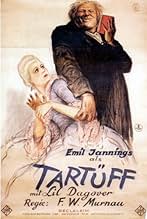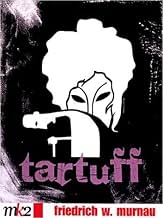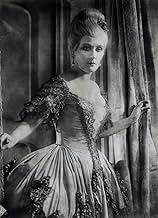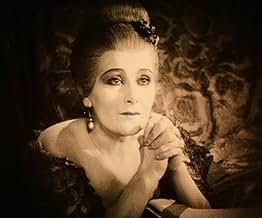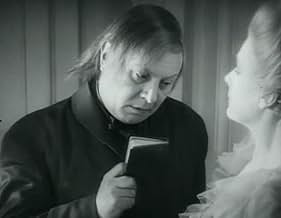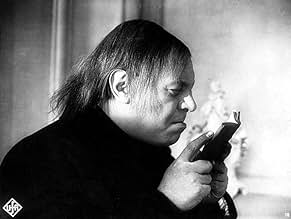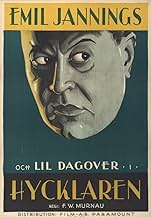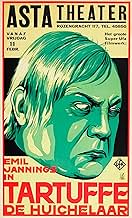ÉVALUATION IMDb
7,1/10
2,9 k
MA NOTE
Ajouter une intrigue dans votre langueA young man shows his millionaire grandfather a film based on Molière's Tartuffe, in order to expose the old man's hypocritical governess who covets his own inheritance.A young man shows his millionaire grandfather a film based on Molière's Tartuffe, in order to expose the old man's hypocritical governess who covets his own inheritance.A young man shows his millionaire grandfather a film based on Molière's Tartuffe, in order to expose the old man's hypocritical governess who covets his own inheritance.
Avis en vedette
A wealthy, elderly man is being taken care of by an evil housekeeper who is working to be the heir to his fortune. While she navigates her plan, she is slowly poisoning him. Along comes his disowned grandson, an actor, who sees through the housekeeper's plans. He sets up a movie version of Moliere's Tartuffe, which is about a man who blindly follows a charlatan, Tartuffe, who is working to become heir to a fortune as well. The Tartuffe film is slow moving and has trouble getting around to the climax, but it's still interesting. Not Murnau's best, but worth a look.
A light fable exploring the theme of hypocrisy and those who exploit the weak-willed under false pretenses. Although it's not a film that bowls you over, there are some interesting touches. The film-within-a-film framework (perhaps one of the first to use it in such a substantial manner), the direct appeals to the audience, the overt sexuality. The look of the film is impressive, with a lavish set to work with, striking lighting techniques, and a few bold camera angles. Emil Jannings is hammy as usual, but in an enjoyable way. The dual stories being told are simplistic and predictable, but fun to go along with. I have yet to see a bad film by Murnau, and even if this isn't one of his most memorable works, it's worthwhile.
Personally I think the other reviewers have been way too hard on this film, and I certainly don't agree that it is "extremely average", "throwaway" or "plain and forgettable". OK - it's not his best by a long shot, but Murnau was such a talented directer/artist that even his weaker films urinate all over the films of most other directors. I thought that the 'film within a film' structure of it worked brilliantly. The cast were all excellent in their acting. The film is pretty great visually too (as one would expect from Murnau) - the 'outer' film is shot in a crisp, modernist style, with adventurous camera angles and no make up, while the central 'film within a film' section was filmed in a more classical, soft-focus style. The film was also quite risky for it's time in its depiction of sexuality, and corruption within the clergy, and several scenes were censored for American audiences.
The central theme of the film is hypocrisy, particularly with those who are overly pious, judgemental and puritanical. This is encapsulated in the words of Tartuffe when he admits: "Who sins in secret - does not sin". Murnau expertly exposes the true roots of fanatically pious behaviour - behind which lies its very opposite. This is very similar to what Freud termed 'reaction formation', whereby a character trait or impulse which one finds unbearable to oneself (the ego) is disguised and repressed by bringing a complete opposite tendency to the facade of ones personality - but this is always noticeable by its exaggeration. The Tartuffe character also indulges in another Freudian defence mechanism called 'projection', whereby one relieves the anxiety caused by an unwelcome trait by projecting it onto others.
It's important to mention that this film also works brilliantly as a satire, and at times I found myself laughing out loud at the grotesque character of Tartuffe. In one scene the obedient Emile is seen rocking Tartuffe as he yawns and lazes in a hammock like a selfish baby. Yet despite the ridiculing, there is always a deep humane concern underlying the film - as there is with all of Murnau's films.
So, like I said: this is not one of his best, but any Murnau film is worth seeing.
The central theme of the film is hypocrisy, particularly with those who are overly pious, judgemental and puritanical. This is encapsulated in the words of Tartuffe when he admits: "Who sins in secret - does not sin". Murnau expertly exposes the true roots of fanatically pious behaviour - behind which lies its very opposite. This is very similar to what Freud termed 'reaction formation', whereby a character trait or impulse which one finds unbearable to oneself (the ego) is disguised and repressed by bringing a complete opposite tendency to the facade of ones personality - but this is always noticeable by its exaggeration. The Tartuffe character also indulges in another Freudian defence mechanism called 'projection', whereby one relieves the anxiety caused by an unwelcome trait by projecting it onto others.
It's important to mention that this film also works brilliantly as a satire, and at times I found myself laughing out loud at the grotesque character of Tartuffe. In one scene the obedient Emile is seen rocking Tartuffe as he yawns and lazes in a hammock like a selfish baby. Yet despite the ridiculing, there is always a deep humane concern underlying the film - as there is with all of Murnau's films.
So, like I said: this is not one of his best, but any Murnau film is worth seeing.
Based on Moliere's classic seventeenth century comedy, this version of TARTUFFE has the eponymous antihero (Emil Jannings) being ultimately outwitted by the family; at the same time the head of the family Orgon (Werner Krauss) remains as blissfully unaware of how to distinguish truth from falsity as he did at the beginning. F. W. Murnau's version is set in a large, rambling house, full of wide staircases and plenty of doors. He proves himself a master of the camera; his close-ups focusing on the pockets as Tartuffe stashes away his ill-gotten gains while pretending to embrace religion, or on Elmire's (Lil Dagover's) breasts, as Tartuffe tries and fails to keep his hands from touching them. Jannings is given full rein to show off his range of facial expressions as Tartuffe; here is a genuinely evil man who believes he can do anything under the cloak of religion. What makes this TARTUFFE most interesting, at least for students of history, is the specially-added prologue and epilogue, in which a young man (André Mattoni) shows his wealthy grandfather (Hermann Picha) the film of TARTUFFE, in order to alert him to the old man's hypocritical governess (Rosa Valetti), and her designs on his fortune. The young man is impoverished, but shown to be much more able to understand human behavior than his grandfather. Through this device Murnau takes a pot-shot at how capitalism and wealth often destroys judgment, creating a covetous society in which everyone is out for themselves. This could be a microcosm of Germany in the mid- Twenties, before the Nazi accession to power. This TARTUFFE moves along at a brisk pace, complemented by a jaunty soundtrack. Worth watching.
While this film does not have the amazing scenes with breathtaking cinematography like FAUST or SUNRISE, this Murnau film still does excel due to the camera-work and great care taken in its production. And, while not the very best silent film available, it's certainly among the better ones.
This story differs from Molière's play in that the entire play is actually part of a larger story--with a prologue and epilogue. The story begins with a rich old man living alone with his supposedly devoted housekeeper. She has convinced the man that his grandson is evil and should be disinherited because he is, oh, horrors,...an ACTOR!!! Instead, she's fooled him into making her the beneficiary. When the grandson shows up to say hello, the old man chases him away and it appears the housekeeper has won. However, given that the young man is an actor, he dresses up as a traveling showman and comes to the house to show them a film--TARTUFFE.
The film stars Emil Jannings as the evil priest, Tartuffe, who has fooled a rich nobleman into forsaking the pleasures of life and becoming an aesthetic, like him. But, the man's wife soon realizes the priest is a charlatan and much of the movie is spent trying to trap the priest in his lies. Naturally, all this is symbolic of the relationship between the housekeeper and the rich man.
The sets, direction and acting are all excellent. The acting is rather restrained compared to some silent films and the story is told in a brisk and watchable manner.
This story differs from Molière's play in that the entire play is actually part of a larger story--with a prologue and epilogue. The story begins with a rich old man living alone with his supposedly devoted housekeeper. She has convinced the man that his grandson is evil and should be disinherited because he is, oh, horrors,...an ACTOR!!! Instead, she's fooled him into making her the beneficiary. When the grandson shows up to say hello, the old man chases him away and it appears the housekeeper has won. However, given that the young man is an actor, he dresses up as a traveling showman and comes to the house to show them a film--TARTUFFE.
The film stars Emil Jannings as the evil priest, Tartuffe, who has fooled a rich nobleman into forsaking the pleasures of life and becoming an aesthetic, like him. But, the man's wife soon realizes the priest is a charlatan and much of the movie is spent trying to trap the priest in his lies. Naturally, all this is symbolic of the relationship between the housekeeper and the rich man.
The sets, direction and acting are all excellent. The acting is rather restrained compared to some silent films and the story is told in a brisk and watchable manner.
Le saviez-vous
- AnecdotesCamilla Horn served as Lil Dagover's foot double in this film. This small role effectively launched her lengthy acting career, as she was noticed by director F.W. Murnau and cast as the lead actress in his film, Faust (1926).
- Autres versionsThis film was published in Italy in an DVD anthology entitled "Il castello di Vogelod", distributed by DNA Srl. The film has been re-edited with the contribution of the film history scholar Riccardo Cusin . This version is also available in streaming on some platforms.
- ConnexionsFeatured in Dämonische Leinwand - Der deutsche Film der zwanziger Jahre (1998)
Meilleurs choix
Connectez-vous pour évaluer et surveiller les recommandations personnalisées
Détails
- Durée1 heure 14 minutes
- Couleur
- Mixage
- Rapport de forme
- 1.33 : 1
Contribuer à cette page
Suggérer une modification ou ajouter du contenu manquant

Lacune principale
By what name was Herr Tartüff (1925) officially released in Canada in English?
Répondre
